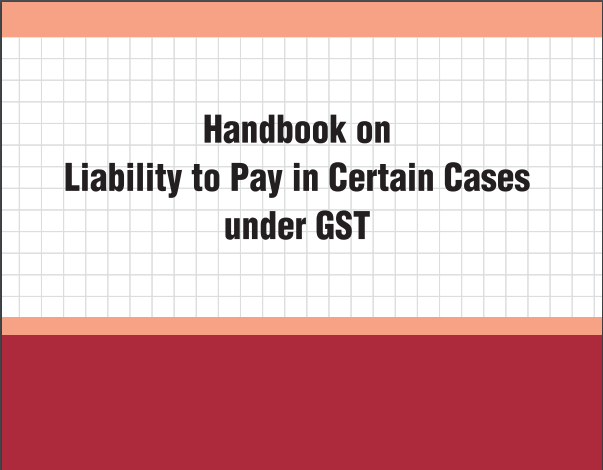Handbook on Liability to Pay in Certain Cases under GST: ICAI
Table of Contents
Handbook on Liability to Pay in Certain Cases under GST
1. Introduction
India has adopted a dual GST model which means that both Central and State Governments will levy tax under GST. Where any default is made in the payment of any of these taxes, interest or penalty shall be imposed accordingly. Therefore, it is imperative to determine who is liable to pay the tax, interest, or penalty. Usually, a supplier is liable to pay under forward charge. Generally, liability to pay tax is determined by the provisions of section 9 of the Central Goods and Services Tax Act, 2017 (hereinafter referred to as ‘CGST Act’) and section 5 of Integrated Goods and Services Tax Act, 2017 (hereinafter referred to as ‘IGST Act’). These sections specify two kinds of mechanisms to pay taxes i.e. forward charge and reverse charge. Under forward charge, the liability to pay taxes is on the supplier whereas, under reverse charge, the liability to pay taxes is on the recipient. Accordingly, the liability to pay interest or penalty arises on the person who is liable to pay taxes.
Related Topic:
Taxability of Salary, Allowances, Commission, Benefits, Perks, Under GST – Both Non-Executive And Executive Director of a Company
However, in certain cases, liability to pay taxes is not restricted to supplier or recipient merely; rather it is extended beyond them. Sections 85 to 94 of the CGST Act deal with certain cases where specific persons in certain cases are made liable to pay taxes, interest, or penalty. These are discussed in the ensuing paragraphs. :
2. Liability In Case of Transfer of Business (Section 85)
2.1 Bare law
(1) Where a taxable person, liable to pay tax under this Act, transfers his business in whole or in part, by sale, gift, lease, leave and license, hire or in any other manner whatsoever, the taxable person and the person to whom the business is so transferred shall, jointly and severally, be liable wholly or to the extent of such transfer, to pay the tax, interest or any penalty due from the taxable person up to the time of such transfer, whether such tax, interest or penalty has been determined before such transfer, but has remained unpaid or is determined thereafter.
(2) Where the transferee of a business referred to in sub-section (1) carries on such business either in his own name or in some other name, he shall be liable to pay tax on the supply of goods or services or both effected by him with effect from the date of such transfer and shall, if he is a registered person under this Act, apply within the prescribed time for amendment of his certificate of registration.
Related Topic:
Handbook For Tax Consultants/Taxpayers-Nov. 2020: IT Deptt.
2.2 Analysis
Section 85 of the CGST Act talks about the liability to pay taxes, interest, or penalty in case of transfer of business. Sub-section (1) states that where any taxable person liable to pay tax under the CGST Act, transfers his business, he and the person to whom the business is so transferred shall be jointly and severally liable to pay tax, interest, or any penalty due up to the time of transfer. The key requisites of this provision are -:
• There is a transfer
• By a taxable person
• The transfer is of business,
• The transfer can be in whole or in part
• The transfer be by way of sale, gift, lease, leave and license, hire, or in any other manner whatsoever
In the above cases, the transferor and transferee shall, jointly and severally, be liable, wholly or to the extent of such transfer, to pay the tax, interest, or any penalty due from the taxable person up to the time of such transfer, whether such tax, interest or penalty has been determined before such transfer, but has remained unpaid or is determined thereafter.
Read & Download the full Copy in pdf:
 ConsultEase Administrator
ConsultEase Administrator
Consultant
Faridabad, India
As a Consultease Administrator, I'm responsible for the smooth administration of our portal. Reach out to me in case you need help.








